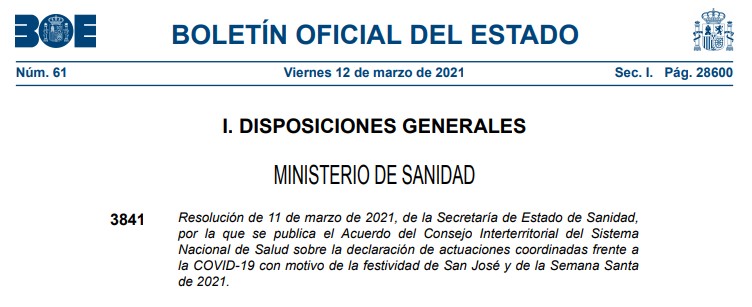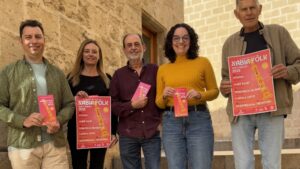TRANSLATION: Resolution regarding limitations during San José and Easter
Translation of the Official State Gazette Nº 61 with regards to the measures which will be in force across Spain for San José and Easter.

Friday 12th March 2021 | translated by MIKE SMITH
Translation into English of the Official State Gazette (BOE) Number 61, published on Friday 12th March 2021, which details the measures that will be adopted to prevent the spread of infection of COVID-19 during the festivities of San José (March 19th) and Semana Santa (March 28th to April 4th), including the limitation on movement at night, the limitation on movement between autonomous territories, and the limitation of social gatherings.
MINISTRY OF HEALTH
3841 Resolution of March 11, 2021, of the Secretary of State for Health, by which the Agreement of the Interterritorial Council of the National Health System is published on the declaration of coordinated actions against COVID-19 on the occasion of the festivity of San José and Easter 2021.
The Plenary of the Interterritorial Council of the National Health System, at its meeting of March 10, 2021, has approved the Agreement of the National Health System Interterritorial Council on the Declaration of coordinated actions in public health against COVID-19 on the occasion of the festivity of San José and Semana Santa 2021.
For the purposes of giving publicity and transparency to the aforementioned Agreement, the Secretary of State for Health has resolved to order its publication in the “Official State Gazette” as an annex to this resolution.
Madrid, March 11th 2021 – The Secretary of State for Health, Silvia Calzón Fernandez.
ANNEX
Agreement of the Interterritorial Council of the National Health System on the declaration of coordinated actions against COVID-19 on the occasion of the feast of San José and Semana Santa in 2021
In July 2020, the National Health System Interterritorial Council approved the Early Response Plan in a COVID-19 pandemic control scenario, which establishes the preparation and response capacities that must be guaranteed in Spain to act against an increase in the transmission of SARS-CoV-2. The Coordinated Response Actions document for the control of COVID-19 transmission was established as a development of the indicators and actions proposed in the Early Response Plan, and establishes the framework of action for a proportional response to different defined alert levels by evaluating risk according to the set of epidemiological indicators, healthcare capacity, and public health.
Given the upward trend in the number of cases that was observed in October in Spain and most European countries, the Spanish Government declared a State of Alarm through Royal Decree 926/2020, of October 25, which will last until May 9th 2021.
In recent days, the situation in Spain in terms of cumulative incidence data (IA) has improved compared to the months of January and February, but as of March 8th the 14-day IA rate is 142.24 and the 7-day IA rate is at 62.73 to seven days, far from the target of 50 cases per 100,000 inhabitants that would place the country at a low risk level or less than 25 that would place it in a new normal scenario as established in the document on Coordinated Response Actions for control of COVID-19 transmission. Similarly, although the positivity rate percentage has decreased in recent weeks, it remains above 5% and the hospital occupancy indicators, especially with reference to ICU beds, which stands at around 25%, continue at levels high or very high, also observing a very slow descent.
It is also observed in recent weeks that the rate of decline in the IA rate has slowed down, even reaching a plateau in some Autonomous Communities in which a decline is no longer taking place.
Vaccination against COVID-19 has allowed the immunization process of the most vulnerable population, health professionals and essential personnel to advance. However, although we can already observe encouraging results, sufficient vaccination coverage has not yet been achieved either in Spain or in the rest of Europe to guarantee the generalized protection of the population. The percentage of the vaccinated population is still very insufficient with regards to immunity, and non-pharmacological measures are currently the only truly effective ones.
Additionally, we have to bear in mind the appearance of variants of SARS-CoV-2 which, due to what is reflected in the countries with greater circulation, present a greater transmission capacity and some of them could affect the immune response capacity.
All these aspects oblige us to be extremely cautious when maintaining the measures to limit non-essential activities and to control movement in the face of public holidays on the occasion of the feast of San José and Semana Santa, since traditionally, national and international trips that produce a large increase in population movement are more frequent as well as an increase in celebrations, meetings and social gatherings of people that can generate a greater risk of transmission of SARS-CoV-2. Among the people who travel, it must be taken into account that a large group in this category corresponds to those who are studying at university and returning to their family homes during the holidays. If prevention measures are not followed, this group of students represents a potential risk for members of the family unit, especially if there is a vulnerable population among them.
These proposals are supported by information from epidemiological studies on the behaviour of the disease, which indicate that the majority of infections are mainly caused by close contact and prolonged exposures and this transmission is much higher in closed places and with an influx of many people, especially if the measures of distancing and hygiene and prevention are not observed at the time. It should also be noted that the establishment of restrictions on the entry and exit of people from the territory of each autonomous community has been associated in different stages of the pandemic with an improvement in the transmission control indicators in the areas of application.
With that said, a specific treatment should be contemplated for Autonomous Communities of the Balearic and Canary Islands, due to the geographical and logistical peculiarities that their isolation implies.
It is also necessary to take into account that the population is currently suffering what has been called pandemic fatigue and different studies carried out show the emotional impact on the population during these months and, in turn, the downward trend of some risk perception parameters. For this reason, it is important to explain to the population the reasons for the restrictions that will be implemented during this period and to achieve maximum coordination and coherence in the recommended measures.
Thus, both the current situation and what we have learned throughout this pandemic year, forces us to establish coordinated actions in order to dispense with non-essential activities where compliance with preventive measures cannot be guaranteed, as well as to avoid unnecessary travel, while maintaining the measures that until now have proven to be effective for the control of the pandemic, focused on limiting the number of people not living together in gatherings, especially indoors, a recommendation to interact in stable cohabiting groups (social bubbles), as well as the rest of the preventive measures already in place.
Based on all the above, it is essential to establish a common framework of coordinated actions and recommendations, informing the population well in advance, all in accordance with Article 65.2.c) of Law 16/2003, of May 28 , of cohesion and quality of the National Health System, Article 151.2.a) of Law 40/2015, of October 1, of the Legal Regime of the Public Sector, as well as with Article 13 of Royal Decree 926/2020, of October 25, declaring a state of alarm to contain the spread of infections caused by SARS-CoV-2.
In view of what the above information, during its session of March 10th 2021, the Plenary of the National Health System Interterritorial Council agreed the following:
First Article
- Compulsory Measures
1.1 – Limitation of territorial movement. Movement will be limited by the perimeter closure of all autonomous communities and cities and subject to the exceptions regulated in article 6 of Royal Decree 926/2020, of October 25. This shall not apply to the autonomous communities of the Canary Islands and the Balearic Islands. Entry into their territories will be limited to the assumptions established in Royal Decree 926/2020, of October 25.
1.2 – Limitation of movement at night. The right of night movement will be limited at most from 11.00pm to 6.00am.
1.3 – Limitation of the gathering of groups of people in public or private spaces. The gathering of groups of people will be limited to a maximum of four in closed public spaces and six in open public spaces, except in the case of cohabitants, i.e. those who live together. In private spaces, meetings will be limited to cohabitants.
Those autonomous communities and cities that are governed by more restrictive measures than those contemplated in section 1 of this agreement, will be the ones who decide whether or not to make them more flexible, taking into account that this would mean a modification of the habits established up to now and that are being fulfilled by the citizens. - Recommendations
2.1 – General measures of response actions according to the level of alert. It is recommended not to lower the alert level in which the autonomous community or city is found from the two weeks prior to the start of Semana Santa, even if the indicators are favourable, and therefore maintain the measures established at that time, or increase them if the evolution of the indicators required it.
2.2 – Measures in relation to celebrations and mass events. Massive events of any kind that involve crowding or concentration of people will not be held. Events in closed spaces will follow the capacity rules and other measures established in the document of Coordinated Response Actions for the control of the transmission of COVID-19 according to the alert level of each community or autonomous city, and will also take into account what established in article 7.3 and 4 of Royal Decree 926/2020, of October 25, and that established by the Decrees of the autonomous communities and cities.
2.3 – Joint communication campaign. It is considered pertinent to carry out an institutional campaign to avoid the relaxation of behaviours, with the slogan “We do not save weeks”, we save lives. For this, the CISNS undertakes to publicise the correct application of the control measures proposed in this document. This effort should include the integration in communication strategies of elements aimed at reducing the impact of “pandemic fatigue” in the control measures and posing the anticipated risk scenarios, including the hope that the good results of the vaccines will control of the epidemic.
2.4 – Coordination with the Spanish Federation of Municipalities and Provinces. These measures should be coordinated as far as possible with local administrations.
Second Article
The Autonomous Community of Madrid has voted against this Agreement and the Autonomous Community of Catalonia abstained.
This Agreement for the declaration of coordinated actions obliges all autonomous communities and autonomous cities to observe them, regardless of the direction of their vote, in accordance with the provisions of the second paragraph of article 151.2.a) of Law 40/2015, of 1 October, of the Legal Regime of the Public Sector, on the Sectorial Conference Agreements referring to a material field, the health sector, in which the General State Administration is assigned general coordination functions.
This declaration of coordinated actions is adopted in accordance with article 65.2 of Law 16/2003, of May 28, on cohesion and quality of the National Health System, and in exercise of the power attributed by article 13 of Royal Decree 926/2020 , to the Interterritorial Council of the National Health System, under the presidency of the Minister of Health, to adopt as many agreements as appropriate, in order to guarantee the necessary coordination in the application of the measures contemplated in that royal decree.
Third Article
The declaration of coordinated actions be effective from its notification to the autonomous communities and cities and until its expiration is approved by the Minister of Health, on prior agreement of the Interterritorial Council of the National Health System, attended by all autonomous communities and cities.
Madrid, March 10th 2021
Information Source




